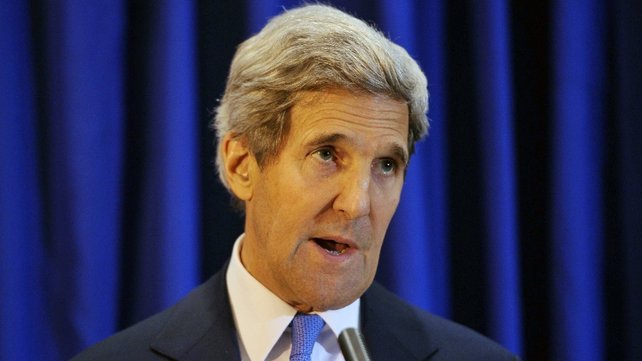
Israel announces it will release a number of Palestinian prisoners as part of an agreement made with US Secretary of State John Kerry to resume peace talks.
Yuval Steinitz, minister responsible for international relations, said it would involve “heavyweight prisoners in jail for decades”.
John Kerry announced on Friday that initial talks would be held in Washington “in the next week or so”.
The Israeli minister’s remarks are the first details of the deal.
John Kerry had declined to tell reporters in Amman what the two sides had agreed to, saying that the “best way to give these negotiations a chance is to keep them private”.
The agreement came at the end of four days of frenetic shuttle diplomacy, on John Kerry’s sixth visit to the region in the past few months.
Yuval Steinitz told Israeli public radio that the deal adhered to the principles set out by Prime Minister Benjamin Netanyahu for kick-starting the talks.
The release of prisoners would take place in stages, he said.
While the number of detainees to be freed is unclear, one Palestinian official said discussions had earlier focused on the release of 350 prisoners over a period of months, including around 100 men held since before 1993, when Israel and the Palestinians signed the Oslo peace accords.
According to Israeli human rights group B’Tselem, 4,817 Palestinians are held in Israeli jails.

For their part, the Palestinians had committed themselves to “serious negotiations” for a minimum of nine months, said Yuval Steinitz, who is a member of the prime minister’s Likud party.
But he made clear that Israel had not accepted Palestinian pre-conditions, including a halt to settlement construction in the occupied West Bank and East Jerusalem.
“There is no chance that we will agree to enter any negotiations that begin with defining territorial borders or concessions by Israel, nor a construction freeze.”
Israel and the Palestinians last held direct talks in 2010, which were halted over the issue of settlement-building.
Settlements are considered illegal under international law, although Israel disputes this.
Announcing the agreed resumption of talks, John Kerry warned that while it was significant, it was still “in the process of being formalized” and the issues that needed to be tackled were “complicated”.
One of the major sticking points for the two sides is the issue of territorial borders.
Palestinian officials say a core demand is that Israel recognizes pre-1967 ceasefire lines but right-wing members of Benjamin Netanyahu’s coalition had refused to accept talks based on the issue.
John Kerry praised the Arab League’s decision to back the plan and said Palestinian negotiator Saeb Erekat and Israeli Justice Minister Tzipi Livni would be travelling to Washington to hold the “initial talks”.
Israeli commentators point out that while Saeb Erekat has been in discussions with the Israeli PM, the Washington talks will not yet involve Benjamin Netanyahu and Palestinian President Mahmoud Abbas.
A spokesman for Mahmoud Abbas said “progress has made it possible to agree on the principles that allow for the negotiations to resume”.
The Middle East Quartet, made up of the US, Russia, the EU and UN, welcomed the “huge achievement” made by John Kerry and his team.
Tzipi Livni responded optimistically to Friday’s developments on her Facebook page, saying “four years of diplomatic stagnation” were about to end, after “months of skepticism and cynicism”.
She promised to protect Israel’s “national and security interests”, saying that she was convinced the talks were “the right thing” for Israel’s future.
Hamas, the Islamist movement that rules Gaza, has rejected the announcement of a return to talks.
“Mahmoud Abbas does not have the legitimacy to negotiate on fateful issues on behalf of the Palestinian people,” spokesman Sami Abu Zuhri said.
[youtube XJg8dGnRZsU]